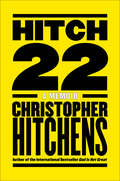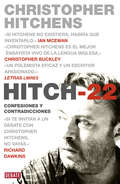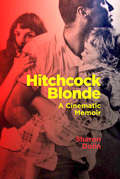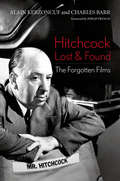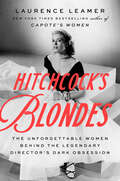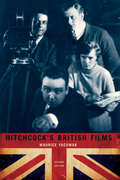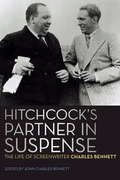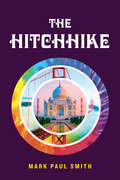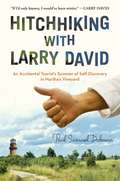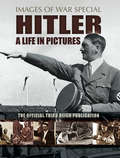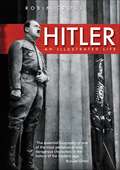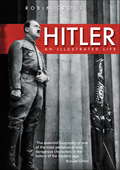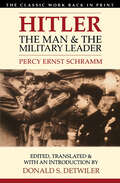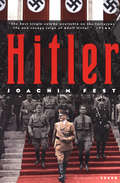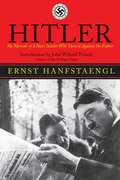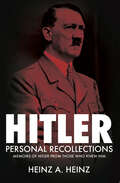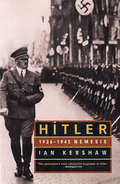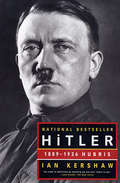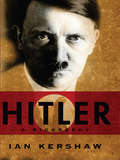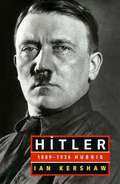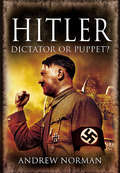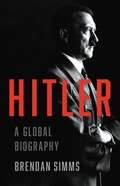- Table View
- List View
Hitch-22: A Memoir
by Christopher HitchensOver the course of his 60 years, Christopher Hitchens has been a citizen of both the United States and the United Kingdom. He has been both a socialist opposed to the war in Vietnam and a supporter of the U.S. war against Islamic extremism in Iraq. He has been both a foreign correspondent in some of the world's most dangerous places and a legendary bon vivant with an unquenchable thirst for alcohol and literature. He is a fervent atheist, raised as a Christian, by a mother whose Jewish heritage was not revealed to him until her suicide. In other words, Christopher Hitchens contains multitudes. He sees all sides of an argument. And he believes the personal is political. This is the story of his life, lived large.
Hitch-22
by Christopher HitchensEn Hitch 22, sus esperadas memorias, Christopher Hitchens, el escritor politico por excelencia, repasa su vida hasta la actualidad, desde su infancia en Portsmouth con una madre que le adoraba, de destino trágico, y un padre reservado y distante; hasta su vida en Washington DC, desde donde ha escrito contra todo tipo de tiranías. En el camino recuerda los amigos, las batallas y las botellas, las grandes luchas y las causas perdidas, y los errores y las dudas que han definido su vida.Hitch 22 es un libro por turnos conmovedor, gracioso, delicioso, enfurecedor e inspirador. Un complemento indispensable a la vida y la obra de un intelectual fundamental de los últimos treinta años.
Hitchcock Annual (Volume #17)
by Sidney Gottlieb Richard AllenHitchcock Annual: Volume 17 contains essays on two of Hitchcock's most well-known films, Notorious and The Birds, and two of his lesser-known works, Juno and the Paycock and Stage Fright. It also includes a detailed study of the unused score for Frenzy by Henry Mancini, an examination of Hitchcock's presence in contemporary art installations and experimental films, and a review essay on two recent books on Hitchcock.
Hitchcock Blonde: A Cinematic Memoir
by Sharon DolinA heady cocktail of sex and trauma, refracted through the lens of ten of Alfred Hitchcock's iconic movies.Imagine an episodic memoir that braids together insights about Alfred Hitchcock's movies with the narrative of a woman's life: scenes of growing up in Brooklyn in the sixties and seventies as the daughter of a schizophrenic mother and a traveling salesman father, adolescent sexual traumas, and adult botched marriages and relationships— all refracted through the lens of ten of Alfred Hitchcock's iconic movies.In each chapter, the narrator—an award-winning poet—trains her idiosyncratic lens on a different film and then onto the uncanny connections they conjure up from her own life. A singular cliffhanging tale, reminiscent in style of Azar Nafisi's Reading Lolita in Tehran and Helen Macdonald's H Is for Hawk.
Hitchcock Lost and Found: The Forgotten Films (Screen Classics)
by Charles Barr Alain KerzoncufKnown as the celebrated director of critical and commercial successes such as Psycho (1960) and The Birds (1963), Alfred Hitchcock is famous for his distinctive visual style and signature motifs. While recent books and articles discussing his life and work focus on the production and philosophy of his iconic Hollywood-era films like Notorious (1946) and Vertigo (1958), Hitchcock Lost and Found moves beyond these seminal works to explore forgotten, incomplete, lost, and recovered productions from all stages of his career, including his early years in Britain.Authors Alain Kerzoncuf and Charles Barr highlight Hitchcock's neglected works, including various films and television productions that supplement the critical attention already conferred on his feature films. They also explore the director's career during World War II, when he continued making high-profile features while also committing himself to a number of short war-effort projects on both sides of the Atlantic. Focusing on a range of forgotten but fascinating projects spanning five decades, Hitchcock Lost and Found offers a new, fuller perspective on the filmmaker's career and achievements.
Hitchcock's Blondes: The Unforgettable Women Behind the Legendary Director's Dark Obsession
by Laurence LeamerBestselling author of Capote&’s Women Laurence Leamer shares an engrossing account of the enigmatic director Alfred Hitchcock that finally puts the dazzling actresses he cast in his legendary movies at the center of the story.Alfred Hitchcock was fixated—not just on the dark, twisty stories that became his hallmark, but also by the blond actresses who starred in many of his iconic movies. The director of North by Northwest, Rear Window, and other classic films didn&’t much care if they wore wigs, got their hair coloring out of a bottle, or were the rarest human specimen—a natural blonde—as long as they shone with a golden veneer on camera. The lengths he went to in order to showcase (and often manipulate) these women would become the stuff of movie legend. But the women themselves have rarely been at the center of the story, until now.In Hitchcock&’s Blondes, bestselling biographer Laurence Leamer offers an intimate journey into the lives of eight legendary actresses whose stories helped chart the course of the troubled, talented director&’s career—from his early days in the British film industry, to his triumphant American debut, to his Hollywood heyday and beyond. Through the stories of June Howard-Tripp, Madeleine Carroll, Ingrid Bergman, Grace Kelly, Janet Leigh, Kim Novak, Eva Marie Saint, and Tippi Hedren—who starred in fourteen of Hitchcock&’s most notable films and who bore the brunt of his fondness and sometimes fixation—we can finally start to see the enigmatic man himself. After all, &“his&” blondes (as he thought of them) knew the truths of his art, his obsessions and desires, as well as anyone.From the acclaimed author of Capote&’s Women comes an intimate, revealing, and thoroughly modern look at both the enduring art created by a man obsessed…and the private toll that fixation took on the women in his orbit.
Hitchcock’s British Films: Second Edition (Contemporary Approaches To Film And Media Ser.)
by Maurice YacowarA reissued classic that examines the structure and themes of each of Hitchcock's British feature films.
Hitchcock’s Partner in Suspense: The Life of Screenwriter Charles Bennett (Screen Classics)
by Charles BennettWith a career that spanned from the silent era to the 1990s, British screenwriter Charles Bennett (1899--1995) lived an extraordinary life. His experiences as an actor, director, playwright, film and television writer, and novelist in both England and Hollywood left him with many amusing anecdotes, opinions about his craft, and impressions of the many famous people he knew. Among other things, Bennett was a decorated WWI hero, an eminent Shakespearean actor, and an Allied spy and propagandist during WWII, but he is best remembered for his commercially and critically acclaimed collaborations with directors Sir Alfred Hitchcock and Cecil B. DeMille.The fruitful partnership began after Hitchcock adapted Bennett's play Blackmail (1929) as the first British sound film. Their partnership produced six thrillers: The Man Who Knew Too Much (1934), The 39 Steps (1935), Sabotage (1936), Secret Agent (1936), Young and Innocent (1937), and Foreign Correspondent (1940). In this witty and intriguing book, Bennett discusses how their collaboration created such famous motifs as the "wrong man accused" device and the MacGuffin. He also takes readers behind the scenes with the Master of Suspense, offering his thoughts on the director's work, sense of humor, and personal life.Featuring an introduction and additional biographical material from Bennett's son, editor John Charles Bennett, Hitchcock's Partner in Suspense is a richly detailed narrative of a remarkable yet often-overlooked figure in film history.
The Hitchhike
by Mark Paul SmithMark Paul Smith's hitchhike from Indiana to India in 1972 changed him from being an Air Force Officer into a conscientious objector. He hitchhiked through the Iron Curtain and worked on a collective farm in Hungary only to find that communism wasn't our real enemy. He met people from North Vietnam who showed him the real enemy was the U.S. war machine. Being an American was popular in those days, but the people of the world showed Smith kindness and kept him alive when he ran out of money. The long road to decision showed him that people everywhere want peace, not war. His faith in the United States of America was restored when he sued the government and won his case in federal court.
Hitchhiking with Larry David
by Paul Samuel DolmanA memoir about a broken-hearted, middle-aged man who stumbles upon solace, meaning, and Larry David while hitchhiking his way around Martha's Vineyard One summer day on Martha's Vineyard Paul Samuel Dolman was hitchhiking, and none other than Larry David pulled over and asked, "You're not a serial killer or something, are you?" The comedic writer and actor from Seinfeld and Curb Your Enthusiasm not only gave Dolman a ride, but helped him find his way during his summer of soul-searching and hitchhiking. Dolman found himself on Martha's Vineyard that summer having made the catastrophic mistake of visiting "The Parental Asylum" in the wake of a painful breakup. His mother is welcoming, albeit senile and neurotically rigid. But his dad "only has the social energy to be nice to humans for about 10 minutes a day." Desperately seeking companionship, Dolman begins hitchhiking around the island and meets a wide array of characters: the super-rich and the homeless, movie stars and common folk, and, of course, Mr. David. Astonishingly, it is Dolman's growing friendship with the famous comedian that becomes the lodestar of his spiritual quest. (Yes, Larry David gets deep!) Written with disarming honest humor and perfectly capturing Larry David's unique comic genius, Hitchhiking with Larry David will leave readers simultaneously laughing and crying as they ponder the mystery and spirituality of life.
Hitler: The Official Third Reich Publication (Images of War Special)
by Bob CarruthersThis exceptional source is probably the best of the contemporary accounts of Hitler in power, albeit from a heavily pro-Nazi stance. The testimonies collected together were based on interviews conducted by Heinz A. Heinz in 1933 and 1934, shortly after Hitler had taken power.Millions of ordinary Germans fell under Hitler's spell and this book is a creation of those emotions. It is very much a product of its time. Written by the party big-wigs, such as Goering, Speer and Goebbels, and published in 1935 under the title Adolf Hitler Bilder Aus Dem Leben Des Furhers, it appeared at a time when they were at the height of their unrivaled powers. This fascinating volume encompasses the superb photography of Heinrich Hoffman, the Munich photographer who was ever present on Hitler's journeys and who grew fabulously wealthy as a result of his intimate access to Hitler. Hitler had an innate understanding of what we would now call public relations. He recognised the excellence of Hoffman's photography and maintained control of his image by limiting the access of other photographers. He also strictly controlled Hoffmann's activities and personally selected the portraits that were allowed to go into circulation.The book incorporates sections on Hitler and the German people, Hitler and the German workers, Hitler and public works and so on, all accompanied by a series of excellent photographs which form a remarkable record of the public face of a man during his brief spell of absolute power. The Nazis were the first party who harnessed the full power of the media in a coherent and all-embracing manner.This is a classic example of the strength of their presentation skills. It is a compelling time-capsule which conveys vividly in almost visceral way the zeitgeist of the thirties in Nazi-Germany. By 1935 the bulk of the German people had fallen in behind Adolf Hitler, and with documents as persuasive as this, it is not too difficult to comprehend the allure of the glittering faade which a stream of publications such as this book sought to create and maintain.
Hitler
by Robin CrossAs Chancellor of Germany between 1933 and 1945, Adolf Hitler exercised unrestricted power over his country's social, political, and economic life. From Hitler's belligerent re-armament programme to his imposition of anti-Semitic legislation and territorially aggressive policies, respected historian Robin Cross maps out the life of one of the most evil men ever to have lived. This succinct and powerful account, illustrated with rare and chillingly evocative photographs, is the essential companion for anyone with a fascination for the twentieth century, the Second World War or the age of dictators.
Hitler
by Robin CrossAs Chancellor of Germany between 1933 and 1945, Adolf Hitler exercised unrestricted power over his country's social, political and economic life. Hitler's belligerent re-armament programme, his imposition of anti-Semitic legislation and his territorially aggressive policies led to genocide and worldwide conflict on an unprecedented scale. Although the subject of numerous biographies and fictional portrayals, there have hitherto been few succinct, factual narratives of Hitler's life. Hitler is a short chronicle of the Fuhrer's career, amplified with numerous rare photographs and artefacts from the period. Second World War expert Robin Cross offers a clear outline of Hitler's progress: from his unhappy childhood as the son of a minor Austrian official in Braunau, to his inglorious early occupation as a jobbing Viennese artist; from his formative experiences as a corporal in the First World War, to his emergence as leader of the National Socialist Workers' Party in the 1920s; from his extraordinary rise to supreme power in 1933, to his suicide amidst the ruins of Berlin in 1945. Commanding, informative and stylish, and written by a scholar who is steeped in knowledge of the period, Hitler is an essential companion for anyone with a fascination for the twentieth century, the Second World War or the age of dictators.
Hitler
by Robin CrossAs Chancellor of Germany between 1933 and 1945, Adolf Hitler exercised unrestricted power over his country's social, political and economic life. Hitler's belligerent re-armament programme, his imposition of anti-Semitic legislation and his territorially aggressive policies led to genocide and worldwide conflict on an unprecedented scale. Although the subject of numerous biographies and fictional portrayals, there have hitherto been few succinct, factual narratives of Hitler's life. Hitler is a short chronicle of the Fuhrer's career, amplified with numerous rare photographs and artefacts from the period. Second World War expert Robin Cross offers a clear outline of Hitler's progress: from his unhappy childhood as the son of a minor Austrian official in Braunau, to his inglorious early occupation as a jobbing Viennese artist; from his formative experiences as a corporal in the First World War, to his emergence as leader of the National Socialist Workers' Party in the 1920s; from his extraordinary rise to supreme power in 1933, to his suicide amidst the ruins of Berlin in 1945. Commanding, informative and stylish, and written by a scholar who is steeped in knowledge of the period, Hitler is an essential companion for anyone with a fascination for the twentieth century, the Second World War or the age of dictators.
Hitler: The Man and the Military Leader
by Donald S. Detwiler Percy Ernst SchrammPercy Ernst Schramm, one of Germany's most distinguished historians, had exceptional access to Adolf Hitler because from January 1943 to the end of the war he was the Fuhrer's official war diarist. This classic volume, long out of print, contains the introductions written by Schramm to critical editions of Hitler's Table Talk and the official War Diary of the High Command of the Wehrmacht. In addition, there are two appendices: the first consisting of excerpts from a study composed by Schramm for the Nuremberg Trials on relations between Hitler and the General Staff; the second a memorandum written by General Jodl in 1946 on Hitler's military leadership.
Hitler: Eine Biographie (Pelican Ser.)
by Joachim C. FestA bestseller in its original German edition and subsequently translated into more than a dozen languages, this book has become a classic portrait of a man, a nation, and an era. Index. Translated by Richard and Clara Winston. A Helen and Kurt Wolff Book
Hitler: The Memoir of the Nazi Insider Who Turned Against the Fuhrer
by Ernst Hanfstaengl John Willard TolandOf American and German parentage, Ernst Hanfstaengl graduated from Harvard and ran the family business in New York for a dozen years before returning to Germany in 1921. By chance he heard a then little-known Adolf Hitler speaking in a Munich beer hall and, mesmerized by his extraordinary oratorical power, was convinced the man would some day come to power. As Hitler's fanatical theories and ideas hardened, however, he surrounded himself with rabid extremists such as Goering, Hess, and Goebbels, and Hanfstaengl became estranged from him. But with the Nazi's major unexpected political triumph in 1930, Hitler became a national figure, and he invited Hanfstaengl to be his foreign press secretary. It is from this unique insider's position that the author provides a vivid, intimate view of Hitler--with his neuroses, repressions, and growing megalomania--over the next several years. In 1937, four years after Hitler came to power, relations between Hanfstaengl and the Nazis had deteriorated to such a degree that he was forced to flee for his life, escaping to Switzerland. Here is a portrait of Hitler as you've rarely seen him.
Hitler: Memoirs of Hitler From Those Who Knew Him
by Heinz A. HeinzHeinz A. Heinz was the only writer authorised by the Nazi Party to draw a biography of the Fhrer for publication in the English speaking world. The result was the 1938 authorised biography of Adolf Hitler entitled Germany's Hitler.The book was based on interviews supplied first hand by those friends, helpers and comrades who had believed in him from the beginning of his political career. Heinz A. Heinz was a professional journalist and author, he interviewed Hitler's old school friends, army colleagues, landlords, his jailer, and early party comrades including an invaluable interview with Anton Drexler to produce an unprecedented insight into Adolf Hitler as viewed by his acquaintances during the inter-war period.These remarkable interviews were given by those who had stood by him in his darkest days, and who lived to see one of the most astounding political achievements in history. Included are vivid and unique descriptions of Hitler at school, his First World War battlefield experiences, the early political struggles, the full story behind the 9th November Beer Hall Putsch, Hitler in prison, and the struggle to power from 1926 to 1933.Featuring a new introduction by Emmy Award winning writer and historian Bob Carruthers, this book is a vital primary source reference work for anyone interested in understanding how and why Hitler won the total adulation and support of such a large section of the German people.
Hitler: 1936-1945 Nemesis
by Ian KershawThe climax and conclusion of one of the best-selling biographies of our time. The New Yorker declared the first volume of Ian Kershaw's two-volume masterpiece "as close to definitive as anything we are likely to see," and that promise is fulfilled in this stunning second volume. As Nemesis opens, Adolf Hitler has achieved absolute power within Germany and triumphed in his first challenge to the European powers. Idolized by large segments of the population and firmly supported by the Nazi regime, Hitler is poised to subjugate Europe. Nine years later, his vaunted war machine destroyed, Allied forces sweeping across Germany, Hitler will end his life with a pistol shot to his head. "[M]ore probing, more judicious, more authoritative in its rich detail...more commanding in its mastery of the horrific narrative."--Milton J. Rosenberg, Chicago Tribune
Hitler: 1889-1936 Hubris
by Ian KershawHailed as the most compelling biography of the German dictator yet written, Ian Kershaw's Hitler brings us closer than ever before to the heart of its subject's immense darkness. From his illegitimate birth in a small Austrian village to his fiery death in a bunker under the Reich chancellery in Berlin, Adolf Hitler left a murky trail, strewn with contradictory tales and overgrown with self-created myths. One truth prevails: the sheer scale of the evils that he unleashed on the world has made him a demonic figure without equal in this century. Ian Kershaw's Hitler brings us closer than ever before to the character of the bizarre misfit in his thirty-year ascent from a Viennese shelter for the indigent to uncontested rule over the German nation that had tried and rejected democracy in the crippling aftermath of World War I. With extraordinary vividness, Kershaw recreates the settings that made Hitler's rise possible: the virulent anti-Semitism of prewar Vienna, the crucible of a war with immense casualties, the toxic nationalism that gripped Bavaria in the 1920s, the undermining of the Weimar Republic by extremists of the Right and the Left, the hysteria that accompanied Hitler's seizure of power in 1933 and then mounted in brutal attacks by his storm troopers on Jews and others condemned as enemies of the Aryan race. In an account drawing on many previously untapped sources, Hitler metamorphoses from an obscure fantasist, a "drummer" sounding an insistent beat of hatred in Munich beer halls, to the instigator of an infamous failed putsch and, ultimately, to the leadership of a ragtag alliance of right-wing parties fused into a movement that enthralled the German people. This volume, the first of two, ends with the promulgation of the infamous Nuremberg laws that pushed German Jews to the outer fringes of society, and with the march of the German army into the Rhineland, Hitler's initial move toward the abyss of war.
Hitler: A Biography (Atalaya Ser. #Vol. 55)
by Ian Kershaw"Magisterial . . . anyone who wishes to understand the Third Reich must read Kershaw."--Niall Ferguson "The Hitler biography of the twenty-first century" (Richard J. Evans), Ian Kershaw's Hitler is a one-volume masterpiece that will become the standard work. From Hitler's origins as a failed artist in fin-de-siecle Vienna to the terrifying last days in his Berlin bunker, Kershaw's richly illustrated biography is a mesmerizing portrait of how Hitler attained, exercised, and retained power. Drawing on previously untapped sources, such as Goebbels's diaries, Kershaw addresses the crucial questions about the unique nature of Nazi radicalism, about the Holocaust, and about the poisoned European world that allowed Hitler to operate so effectively. Some images in the ebook are not displayed owing to permissions issues.
Hitler: 1889-1936 Hubris
by Ian KershawThis is a biography of Hitler from birth to 1936, and his creation of The Third Reich, i.e., Nazi Germany.
Hitler: A Portrait of a Tyrant
by Albert MarrinA biography of the struggling Austrian artist who rose from obscurity to power as the leader of the Nazi party and, later, the German nation, and whose ambitions led the world to war.
Hitler: Dictator or Puppet?
by Andrew NormanWritten by an authority on Adolf Hitler, this book charts new ground and shows how the writings of a deluded ex-monk, Lanz von Liebenfels and the pseudo-science of Liebenfels and other writers, convinced Hitler that Germanys destiny was to save the world from a Jewish-Bolshevik conspiracy. It was this perverted sense of destiny that drove the Nazi Party and led to the outbreak of WWII and the deaths of some sixty million people as well as the destruction of much of Europe. Using the writings of Liebenfels from his magazine Ostara, Dr Andrew Norman demonstrates how the mass murders of Jews, Gypsies, mentally-ill people and those regarded as less than human had its roots in articles written by Liebenfels. An index of Ostara articles is included and their very titles indicate the malign influences that shaped Hitlers Germany.
Hitler: A Global Biography
by Brendan SimmsFrom a prize-winning historian, the definitive biography of Adolph HitlerHitler offers a deeply learned and radically revisionist biography, arguing that the dictator's main strategic enemy, from the start of his political career in the 1920s, was not communism or the Soviet Union, but capitalism and the United States. Whereas most historians have argued that Hitler underestimated the American threat, Simms shows that Hitler embarked on a preemptive war with the United States precisely because he considered it such a potent adversary. The war against the Jews was driven both by his anxiety about combatting the supposed forces of international plutocracy and by a broader desire to maintain the domestic cohesion he thought necessary for survival on the international scene.A powerfully argued and utterly definitive account of a murderous tyrant we thought we understood, Hitler is essential reading for anyone seeking to understand the origins and outcomes of the Second World War.
